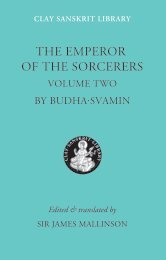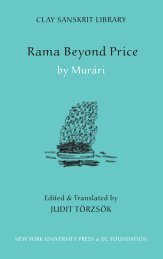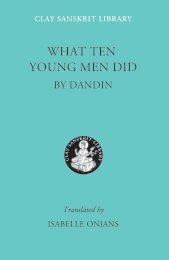The Little Clay Cart - Clay Sanskrit Library
The Little Clay Cart - Clay Sanskrit Library
The Little Clay Cart - Clay Sanskrit Library
You also want an ePaper? Increase the reach of your titles
YUMPU automatically turns print PDFs into web optimized ePapers that Google loves.
CLAY SANSKRIT LIBRARY<br />
<strong>The</strong> <strong>Little</strong> <strong>Clay</strong> <strong>Cart</strong><br />
by Shúdraka<br />
Translated by<br />
DIWAKAR ACHARYA<br />
With a Foreword by Partha Chatterjee<br />
NEW YORK UNIVERSIT Y PRESS & JJC FOUNDATION
T H E C L A Y S A N S K R I T L I B R A R Y<br />
F O U N D E D B Y J O H N & J E N N I F E R C L A Y<br />
G E N E R A L E D I T O R<br />
Sheldon Pollock<br />
E D I T E D B Y<br />
Isabelle Onians<br />
www.claysanskritlibrary.com<br />
www.nyupress.org
Artwork by Robert Beer.<br />
Typeset in Adobe Garamond Pro at 10.25 : 12.3+pt.<br />
XML-development by Stuart Brown.<br />
Editorial input from Dániel Balogh, Ridi Faruque,<br />
Chris Gibbons, Tomoyuki Kono & Eszter Somogyi.<br />
Printed and bound in Great Britain by<br />
T.J. International, Cornwall, on acid-free paper.
T H E L I T T L E<br />
C L A Y C A R T<br />
b y Ś Ū D R A K A<br />
T R A N S L A T E D B Y<br />
Diwakar Acharya<br />
W I T H A F O R E W O R D B Y<br />
P A R T H A C H A T T E R J E E<br />
N E W Y O R K U N I V E R S I T Y P R E S S<br />
J J C F O U N D A T I O N<br />
2 0 0 9
Copyright © 2009 by the CSL<br />
All rights reserved.<br />
First Edition 2009<br />
�e <strong>Clay</strong> <strong>Sanskrit</strong> <strong>Library</strong> is co-published by<br />
New York University Press<br />
and the JJC Foundation.<br />
Further information about this volume<br />
and the rest of the <strong>Clay</strong> <strong>Sanskrit</strong> <strong>Library</strong><br />
is available at the end of this book<br />
and on the following websites:<br />
www.claysanskritlibrary.com<br />
www.nyupress.org<br />
ISBN-13: 978-0-8147-0729-6 (cloth : alk. paper)<br />
ISBN-10: 0-8147-0729-7 (cloth : alk. paper)<br />
<strong>Library</strong> of Congress Cataloging-in-Publication Data<br />
Śūdraka.<br />
[M.rcchaka.tikā. English & <strong>Sanskrit</strong>]<br />
�e little clay cart / by Śūdraka ; translated by Diwakar Acharya ;<br />
with a foreword by Partha Chatterjee. -- 1st ed.<br />
p. cm.<br />
Play.<br />
In English and <strong>Sanskrit</strong> (romanized) on facing pages;<br />
includes translation from <strong>Sanskrit</strong>.<br />
Includes bibliographical references.<br />
ISBN-13: 978-0-8147-0729-6 (cl : alk. paper)<br />
ISBN-10: 0-8147-0729-7 (cl : alk. paper)<br />
1. Sudraka--Translations into English. I. Acharya, Diwakar II. Title.<br />
PK3798.S91M713 2009<br />
891'.22--dc22<br />
2008049543
C O N T E N T S<br />
CSL Conventions vii<br />
Foreword xv<br />
Introduction xix<br />
Dramatis Personæ xl<br />
THE LITTLE CLAY CART<br />
Prologue �e Suitable Husband 3<br />
Act One �e Deposition of Ornaments 19<br />
Act Two �e Gambling Masseur 81<br />
Act �ree Cutting a Hole 129<br />
Act Four Mádanika and Shárvilaka 167<br />
Act Five A Rainy Day 221<br />
Act Six Mix-up of Carriages 273<br />
Act Seven �e Escape of Áryaka 313<br />
Act Eight Vasánta·sena Strangled 327<br />
Act Nine �e Trial 395<br />
Act Ten �e Conclusion 455<br />
Chāyā 531<br />
Notes 617
ACT EIGHT<br />
VASÁNTA·SENA STRANGLED
8.1<br />
8.5<br />
(tata.h praviśaty ārdra| cīvara| hasto bhik.su .h.)<br />
bhik.su .h: ��� ajjā, kaledha dhamma|śa .mcaam. ���<br />
��� śa .mjammadha .nia|po.ta .m,<br />
.nicca .m jaggedha jhā .na|pa .dahe .na.<br />
viśamā india|colā<br />
halanti cila|śa .mcida .m dhammam. ��� [1]<br />
��� avi a, a| .niccadāe pekkhia .navala .m dāva dhammā .na .m śala .na<br />
mhi.* ���<br />
��� pañca|ja .na je .na mālidā, itthia mālia gāma lakkhide,<br />
a|bale a ca .n .dāla mālide, avaśa .m śe .nala śagga gāhadi. ��� [2]<br />
��� śila mu .n .dide, tu .n .da mu .n .dide,<br />
citta .na mu .n .dide, kīśa mu .n .dide?<br />
jāha u .na a citta mu .m .dide,<br />
śāhu śu.t.thu śila tāha mu .n .dide. ��� [3]<br />
��� gihida|kaśā’|odae eśe cīvale jāva eda .m laś.tia|śālakāha kelake<br />
ujjā .ne paviśia pokkhali .nīe pakkhālia lahu .m lahu .m<br />
avakkamiśśam. ��� (parikramyā tathā karoti.)<br />
nepathye śakāra .h: ��� ciś.ta, le duś.ta|śama .nakā, ciś.ta! ���<br />
bhik.su .h (d.r.s.tvā sa| bhayam): ��� hī avida mā .nahe! eśe śe lāa|<br />
śāla | Śa .m.thā .ne āade. ekke .na bhikkhu .nā avalāhe kide<br />
a .n .na .m pi jahi .m jahi .m bhikkhu .m pekkhadi tahi .m tahi .m<br />
go .na .m vva .nāsa .m vindhia ovāhedi. tā kahi .m a|śala .ne<br />
gamiśśam? adha vā bha.t.tālake jjeva Buddhe me śala .ne. ���<br />
328
(Enter a monk with a wet robe in his hand.) 8.1<br />
monk: You ignorant people, accumulate merit!<br />
Keep your belly under control, stay ever awake with<br />
the drum of meditation!<br />
�e hostile senses are thieves who rob merit<br />
accumulated over time.<br />
Well then, upon realizing the fleeting nature of the world,<br />
I sought refuge in virtuous deeds.<br />
He who has slain the five men, protected the town by 8.5<br />
slaying the woman,<br />
And has also slain the feeble pariah—that man<br />
will surely attain heaven.*<br />
Your head is shaved, your face is shaved, but your soul<br />
is not shaved; why do you shave at all?<br />
Again, if one’s soul is shaved, one’s head is truly shaved.<br />
I’ll go in this garden of the king’s brother-in-law and wash<br />
this wet red-dyed gown in the lotus pond, and then<br />
quickly be off. (He goes around and sets to work.)<br />
voice (offstage): Stop, you wretched monk, stop!<br />
monk (looking up with fear): Heavens! Sansthánaka is coming—the<br />
king’s brother-in-law! Once a monk offended<br />
him, and now, whenever he sees one, he pierces his nose<br />
as though he were a cow and chases him off. So where<br />
can I take refuge, helpless fellow that I am? But the Lord<br />
Buddha alone is my refuge.<br />
329
8.10<br />
8.15<br />
8.20<br />
the little clay cart<br />
(praviśya sa| kha.dgena vi.tena saha)<br />
śakāra .h: ��� ciś.ta, le duś.ta|śama .nakā, ci.s.ta! āvā .naa|majjha|<br />
paviś.taśśa via latta|mūlaaśśa śīśa .m de mo .daïśśam. ��� (iti<br />
tā.dayati.)<br />
vi.ta .h: kā .nelī |māta .h, na yukta .m nirveda |dh.rta |kā.sāya .m<br />
bhik.su .m tā .dayitum. tat kim anena? ida .m tāvat sukh’|<br />
ôpagamyam udyāna .m paśyatu bhavān.<br />
a|śara .na|śara .na|pramoda|bhūtair<br />
vana|tarubhi .h kriyamā .na|cāru|karma,<br />
h.rdayam iva dur|ātmanām a|gupta .m<br />
navam iva rājyam a|nirjit’|ôpabhogyam. [4]<br />
bhik.su .h: ��� śāadam! paśīdadu uvāśake. ���<br />
śakāra .h: ��� bhāve, pekkha pekkha! ākkośadi mam! ���<br />
vi.ta .h: ki .m bravīti?<br />
śakāra .h: ��� uvāśake tti ma .m bha .nādi. ki .m hagge .nāvide? ���<br />
vi.ta .h: Buddh’|ôpāsaka iti bhavanta .m stauti.<br />
śakāra .h: ��� thu .nu, śama .nakā, thu .nu! ���<br />
bhik.su .h: ��� tuma .m dha .n .ne! tuma .m pu .n .ne! ���<br />
śakāra .h: ��� bhāve, «dha .n .ne, pu .n .ne» tti ma .m bha .nādi! ki .m<br />
hagge śalāvake koś.take kombha|kāle vā? ���<br />
330
act eight: vasánta·sena strangled<br />
(Enter shakára accompanied by the libertine bearing a 8.10<br />
sword.)<br />
shakára: Stop, you wretched monk, stop! I’ll smash your<br />
head like a radish at a drinking party! (He beats him.)<br />
libertine: Bastard, it’s not proper to beat a monk who’s<br />
renounced everything and taken the ochre robe. Why<br />
bother with him? Look, sir, this garden is worthy of<br />
visiting.<br />
�e trees are performing the happy task of pleasing and<br />
protecting the unprotected.<br />
�e garden is exposed like the heart of evil men;<br />
Like a new kingdom, its pleasures have yet to be enjoyed.<br />
monk: Welcome! Be appeased, servant.<br />
shakára: Look, Sir, look! He’s insulting me! 8.15<br />
libertine: What’s he saying?<br />
shakára: He’s calling me a servant. Am I a barber?<br />
libertine: He’s praising you by calling you the Buddha’s<br />
servant.<br />
shakára: Praise me, monk, praise me more!<br />
monk: You are blessed! You are righteous! 8.20<br />
shakára: Sir, he’s calling me “corny” and “stuffed!” Am I a<br />
bin, a pot or a potter?*<br />
331
the little clay cart<br />
vi.ta .h: kā .nelī|māta .h, nanu dhanyas tva .m pu .nyas tvam iti<br />
bhavanta .m stauti.<br />
śakāra .h: ��� bhāve, tā kīśa eśe idha āgade? ���<br />
bhik.su .h: ��� ida .m cīvala .m pakkhālidum. ���<br />
śakāra .h: ��� 8.25 ale duś.ta | śama .nakā, eśe mama bahi .nī | vadi .nā<br />
śavv’|ujjā .nā .na .m pavale Pupphakala .n .d’|ujjā .ne di .n .ne jahi<br />
.m dāva śu .nahakā śiālā pā .nia .m pianti. hagge vi pabala|<br />
puliśe ma .nuśśake .na .nhāāmi. tahi .m tuma .m pukkhali .nīe<br />
pulā .na|kuluttha|jūśa|śava .n .nāi .m duśśa|gandhiāi .m cīvalāi<br />
.m pakkhāleśi. tā tuma .m ekka|pahālia .m kalemi! ���<br />
8.30<br />
vi.ta .h: kā .nelī|māta .h, tathā tarkayāmi yath” ânen’ â|cira|<br />
pravrajitena bhavitavyam.<br />
śakāra .h: ��� kadha .m bhāve jā .nādi? ���<br />
vi.ta .h: kim atra jñeyam? paśya!<br />
ady’ âpy asya tath” âiva keśa|virahād<br />
gaurī lalā.ta|cchavi .h<br />
kālasy’ âlpatayā ca cīvara|k.rta .h<br />
skandhe na jāta .h ki .na .h,<br />
n’ âbhyastā ca ka.sāya|vastra|racanā<br />
dūra .m nigū .dh’|ântaro<br />
vastr’|ântaś ca pa.t’|ôcchrayāt praśithila .h<br />
skandhe na sa .mti.s.thate. [5]<br />
bhik.su .h: ��� uvāśake, evvam. a|cila|pavvajide hagge. ���<br />
332
act eight: vasánta·sena strangled<br />
libertine: Bastard, he is praising you and saying you are<br />
blessed and you are righteous.<br />
shakára: Sir, why’s this man come here?<br />
monk: To wash this robe.<br />
shakára: Oh, you wretched monk! My brother-in-law has 8.25<br />
given me this Pushpa·karándaka garden, the best of all<br />
gardens, where dogs and jackals drink water; I don’t<br />
bathe here, eminent and manly though I am. But you’re<br />
washing your horrible smelling robes, the color of stale<br />
black bean soup, in this pool! Why, I’ll kill you with one<br />
blow!<br />
libertine: Bastard, I guess that this man must have quite<br />
recently renounced.<br />
shakára: How, sir, do you know?<br />
libertine: What’s there to know? Look!<br />
Even now the glow of his forehead is the same old pale<br />
color, though no hair shades it.<br />
�ere’s no callus on his shoulder, for his robe has been<br />
worn for a very short period.<br />
Nor is he practiced in wearing red robes, for his loins<br />
are wide open to view.<br />
And the robe’s edge is much too loose: the cloth<br />
inches up, and does not clasp his shoulder.<br />
monk: It’s true, servant! I’ve quite recently renounced. 8.30<br />
333
8.35<br />
8.40<br />
the little clay cart<br />
śakāra: ��� tā kīśa tuma .m jāta|mettaka jjeva .na pavvajide? ��� (iti<br />
tā.dayati.)<br />
bhik.su .h: ��� .namo Buddhaśśa! ���<br />
vi.ta .h: kim anena tā .ditena tapasvinā? mucyatām, gacchatu!<br />
śakāra .h: ��� ale, ciś.ta dāva jāva śa .mpadhālemi. ���<br />
vi.ta .h: kena sārdham?<br />
śakāra .h: ��� atta .no ha .dakke .na. ���<br />
vi.ta .h: hanta, na gata .h!<br />
śakāra .h: ��� puttakā ha .dakkā, bhaś.take puttake! eśe śama .nake<br />
avi .nāma ki .m gacchadu ki .m ciś.tadu? ��� (sva| gatam) ��� .n’ âvi<br />
gacchadu .n’ âvi ciś.tadu. ��� (prakāśam) ��� bhāve, śa .mpadhālida<br />
.m mae ha .dakke .na śaha. eśe maha ha .dakke bha .nādi. ���<br />
vi.ta .h: ki .m bravīti?<br />
śakāra .h: ��� mā vi gacchadu mā vi ciś.tadu, mā vi ūśaśadu<br />
māvi .nīśaśadu. idha jjeva jhatti pa .dia maledu. ���<br />
bhik.su .h: ��� .namo Buddhaśśa! śala .n’|āgade mhi! ���<br />
vi.ta .h: gacchatu!<br />
334
act eight: vasánta·sena strangled<br />
shakára: Well, why didn’t you renounce the moment you<br />
were born? (He beats him.)<br />
monk: Homage to the Buddha!<br />
libertine: What will you gain by beating this poor chap?<br />
Release him and let him go his way!<br />
shakára: Well, just wait a moment! I’ll do some consulting!<br />
libertine: With whom? 8.35<br />
shakára: With my own heart!<br />
libertine: Ah, he’s still here!<br />
shakára: Oh laddie, my heart, my little master! Tell me,<br />
should this monk go or stay? (to himself) He should neither<br />
go nor stay. (aloud) Sir! I’ve consulted my heart. My<br />
heart says that…<br />
libertine: What does it say?<br />
shakára: He should neither go nor stay, breathe neither in 8.40<br />
nor out, but fall down here and die on the spot.<br />
monk: Homage to the Buddha! I take refuge in you!<br />
libertine: Let him go!<br />
335
8.45<br />
8.50<br />
śakāra .h: ��� .na .m śamae .na. ���<br />
vi.ta .h: kīd.rśa .h samaya .h?<br />
the little clay cart<br />
śakāra .h: ��� tadhā kaddama .m pheladu jadhā pā .nia .m pa˙nk’|<br />
āila .m .na hodi. adha vā pā .nia .m puñjī|kadua kaddama .m<br />
pheladu. ���<br />
vi.ta .h: aho mūrkhatā!<br />
viparyasta|manaś|ce.s.tai .h<br />
śilā|śakala|var.smabhi .h<br />
mā .msa|v.rk.sair iya .m mūrkhair<br />
bhār’|ākrāntā vasu .m|dharā. [6]<br />
(bhik.sur nā.tyen’ ākrośati.)<br />
śakāra .h: ��� ki .m bha .nādi? ���<br />
vi.ta .h: stauti bhavantam.<br />
śakāra .h: ��� thu .nu thu .nu! pu .no vi thu .nu! ���<br />
(tathā k.rtvā ni.skrānto bhik.su .h.)<br />
vi.ta .h: kā .nelī|māta .h! paśy’ ôdyānasya śobhām!<br />
336<br />
amī hi v.rk.sā .h phala|pu.spa|śobhitā .h<br />
ka.thora|ni.spanda|lat”|ôpave.s.titā .h,<br />
n.rp’|ājñayā rak.si|janena pālitā<br />
narā .h sa|dārā iva yānti nirv.rtim. [7]
act eight: vasánta·sena strangled<br />
shakára: All right, but on one condition!<br />
libertine: What condition?<br />
shakára: �at he throw away mud in such a way that its 8.45<br />
water is not soiled. Or else that he heap up the water<br />
and throw away the dirt.<br />
libertine: What stupidity!<br />
�e earth is groaning under a load of fools:<br />
Trees of flesh, absurd in mind and deed, and with stones<br />
for bodies.<br />
(�e monk abuses shakára with gestures.)<br />
shakára: What does he say?<br />
libertine: He’s praising you. 8.50<br />
shakára: Praise me! Praise me! Praise me again!<br />
(�e monk, continuing his antics, exits.)<br />
libertine: Bastard, look at this garden’s splendor!<br />
�ese trees, glorious with their fruits and flowers,<br />
Embraced by vines tight and breathless,<br />
And protected by guards under royal decree,<br />
Attain delight, like men with their wives.<br />
337
8.55<br />
8.60<br />
the little clay cart<br />
śakāra .h: ��� śuś.tu bhāve bha .nādi. ���<br />
��� bahu|kuśuma|vicittidā a bhūmī,<br />
kuśuma|bhale .na vi .nāmidā a rukkhā,<br />
duma|śihala|lad”|âalambamā .nā<br />
pa .naśa|phalā via vā .nalā lalanti. ��� [8]<br />
vi.ta .h: kā .nelī|māta .h, ida .m śilā|talam adhyāsyatām!<br />
śakāra .h: ��� eśe mhi āśide. ��� (iti vi.tena sah’ ôpaviśati.) ��� bhāve,<br />
ajja vi ta .m Vaśantaśe .nia .m śumalāmi. dujja .na|vaa .na .m via<br />
ha .dakkādo .na ośaladi. ���<br />
vi.ta .h (sva| gatam): tathā nirasto ’pi smarati tām. atha vā,<br />
strībhir vimānitānā .m<br />
kā|puru.sā .nā .m vivardhate madana .h,<br />
sat|puru.sasya sa eva tu<br />
bhavati m.rdur n’ âiva vā bhavati. [9]<br />
śakāra .h: ��� bhāve, kā vi velā �āvalaka|ce .daśśa bha .nidaśśa<br />
pavaha .na .m ge .nhia lahu .m lahu .m āacch’ êtti. ajja vi .na<br />
āacchadi tti cila .m mhi bubhukkhide. majjha .nhe .na śakkīadi<br />
pādehi .m gantum. tā pekkha pekkha! ���<br />
��� .naha|majjha|gade śūle<br />
duppekkhe kuvida|vā .nala|śalicche,<br />
bhūmī da .dha|śa .mtattā<br />
hada|putta|śade vva Gandhālī. ��� [10]<br />
vi.ta .h: evam etat.<br />
i �e wife of Dhrita·rashtra and the mother of Duryódhana and his<br />
brothers<br />
338
act eight: vasánta·sena strangled<br />
shakára: Well put, sir! 8.55<br />
�e ground is colored with many flowers,<br />
And the trees bow under their weight of blossoms.<br />
Hanging from vines at the top of trees,<br />
�e monkeys dangle like jackfruits.<br />
libertine: Please sit down on this flat rock!<br />
shakára: I’m seated. (He sits with the libertine.) Good sir,<br />
I still remember Vasánta·sena. She fills my mind like the<br />
words of a knave.<br />
libertine (to himself): He still dreams of her, though refused<br />
in such a way. Or is it that,<br />
A base man’s passion increases if women despise him, 8.60<br />
while a good man’s passion reduces or vanishes.<br />
shakára: Sir, it’s been quite a long time since I asked Sthávaraka<br />
to come here with the carriage as fast as possible,<br />
but he hasn’t come. I started feeling hungry long ago.<br />
And I can’t walk at noon. Look! Look!<br />
�e sun in the midst of the sky is, like an enraged ape,<br />
hard to gaze upon.<br />
�e earth is sorely inflamed, like Gandhári i when<br />
her hundred sons were killed.<br />
libertine: So it is!<br />
339
clay sanskrit library<br />
WWW.CLAYSANSKRITLIBRARY.COM<br />
Packed with action, love, humor, courage, and intrigues,<br />
<strong>The</strong> <strong>Little</strong> <strong>Clay</strong> <strong>Cart</strong> is the most widely performed<br />
<strong>Sanskrit</strong> play in recent times. Ancient Indian urban life<br />
is enacted here by realistic characters whose words<br />
translate smoothly into modern language. This is a work<br />
whose dramatic possibilities outshine the poetic qualities<br />
valorized in all other <strong>Sanskrit</strong> drama.<br />
NEW YORK UNIVERSITY PRESS<br />
Washington Square<br />
New York, NY 10003<br />
www.nyupress.org<br />
����������������������<br />
�����<br />
� ������ ������









